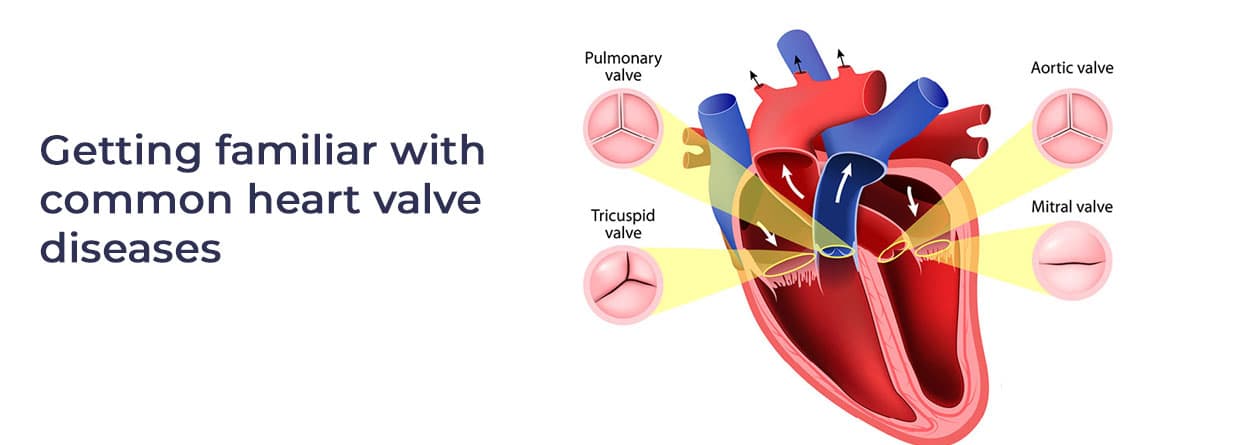
The human heart is a vital organ that pumps blood throughout the body. It has four chambers, and each chamber has a valve that regulates blood flow. These valves ensure that blood flows in one direction, and if they become damaged or diseased, they can cause serious health problems.
The human heart is a vital organ that pumps blood throughout the body. It has four chambers, and each chamber has a valve that regulates blood flow. These valves ensure that blood flows in one direction, and if they become damaged or diseased, they can cause serious health problems.
In this blog, we will discuss the most common heart valve diseases and their treatments.
Heart valve problems cause a variety of symptoms which can vary from one patient to another depending on the severity. Some people with heart valve problems may not experience any symptoms. Therefore, if you suspect heart valve disease symptoms, it is important to see a doctor for a proper diagnosis and treatment. Some of the most common signs and symptoms of heart valve problems include -
Heart valve problems can have a variety of causes. In some cases, the primary cause of heart valve problems may be unknown. Additionally, some people may have a higher risk of developing heart valve problems due to risk factors such as a family history of valve disease, certain medications, or other underlying health conditions and some bad habits that can effect heart valve. Regular check-ups with a doctor can help identify and manage heart valve problems at the earliest.
There are several types of heart valve diseases depending on the severity and origin. Here are some common types of heart valve disorders and ways in which you can treat them or manage the symptoms.
Treatment - The treatment for aortic stenosis depends on the severity of the condition. Mild cases may not require treatment, but severe cases may require valve replacement surgery or a minimally invasive procedure called transcatheter aortic valve replacement (TAVR).
Treatment - Treatment for mitral regurgitation depends on the severity of the condition. Mild cases may not require treatment, but severe cases may require valve repair or replacement surgery.
Treatment - Treatment for mitral stenosis may include medication to relieve symptoms, but severe cases may require valve replacement surgery.
Treatment - Treatment for tricuspid regurgitation depends on the severity of the condition. Mild cases may not require treatment, but severe cases may require valve repair or replacement surgery.
Heart valve diseases can be severe and require prompt treatment. If you experience any symptoms of heart valve disease, such as shortness of breath, fatigue, or chest pain, you should seek medical attention immediately. Treatment options for heart valve diseases include medication, minimally invasive procedures, and valve repair or replacement surgery. Your doctor can help determine the best treatment option for your individual case.
FAQ
Heart valve replacement surgery is a major procedure which may involve a significant amount of risks. Therefore, talk to your doctor to know about the health risks and benefits of the procedure.
Yes, heart valve replacement can be done with a surgical procedure called TAVR (transcatheter aortic valve replacement) which is a minimally invasive procedure. The surgeon uses a catheter to treat patients who are at a greater risk of complications from open heart surgery.
While medications cannot completely treat heart valve diseases, they can help manage mild to moderate symptoms. Discuss the symptoms with the doctor to know the best treatment for your heart condition.
No, mitral valve prolapse does not increase the risk of a heart attack. However, there may be symptoms which can resemble a heart attack. It is important to discuss your condition with the doctor to avoid the risk of major cardiac issues.
Written and Verified by:

Dr. Ashok B. Malpani is a Senior Consultant in Cardiology Dept. at BM Birla Heart Hospital, Kolkata, with over 34 years of experience. He specializes in complex angioplasty, primary angioplasty, and pacemaker implantation.
Similar Cardiology Blogs
Book Your Appointment TODAY
© 2024 BMB Kolkata. All Rights Reserved.